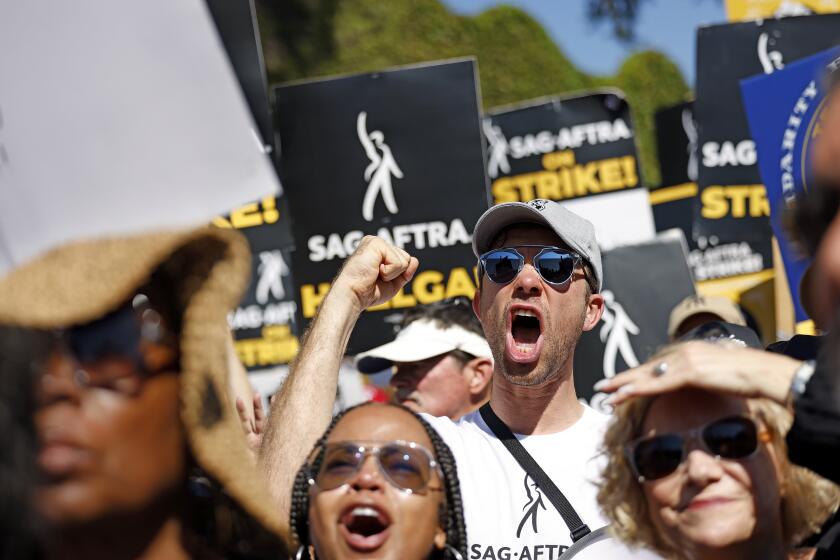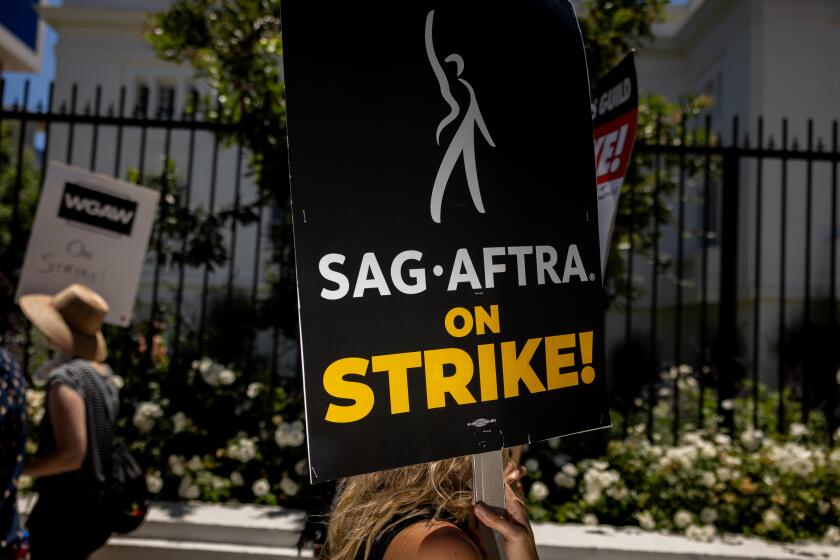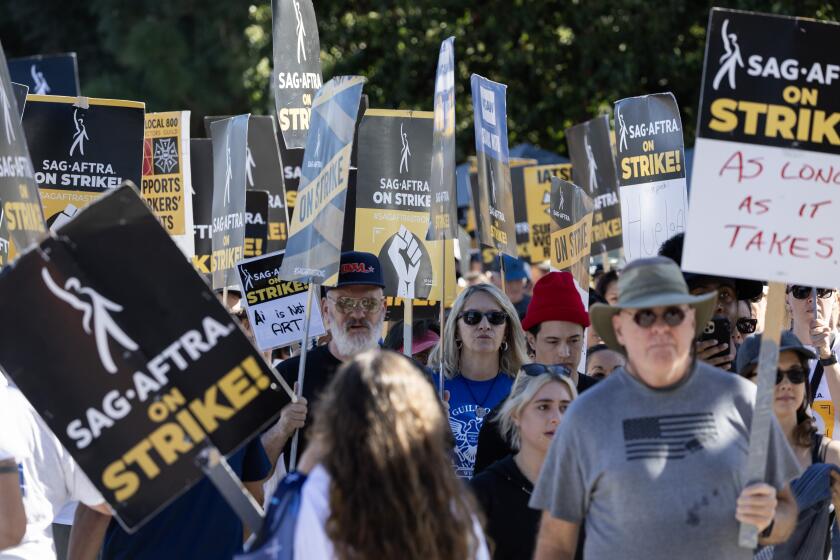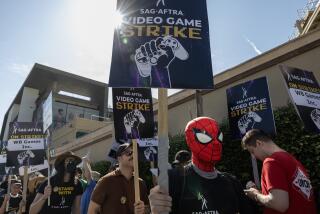SAG-AFTRA and the studios just reached a deal to end the actors’ strike. What’s next?
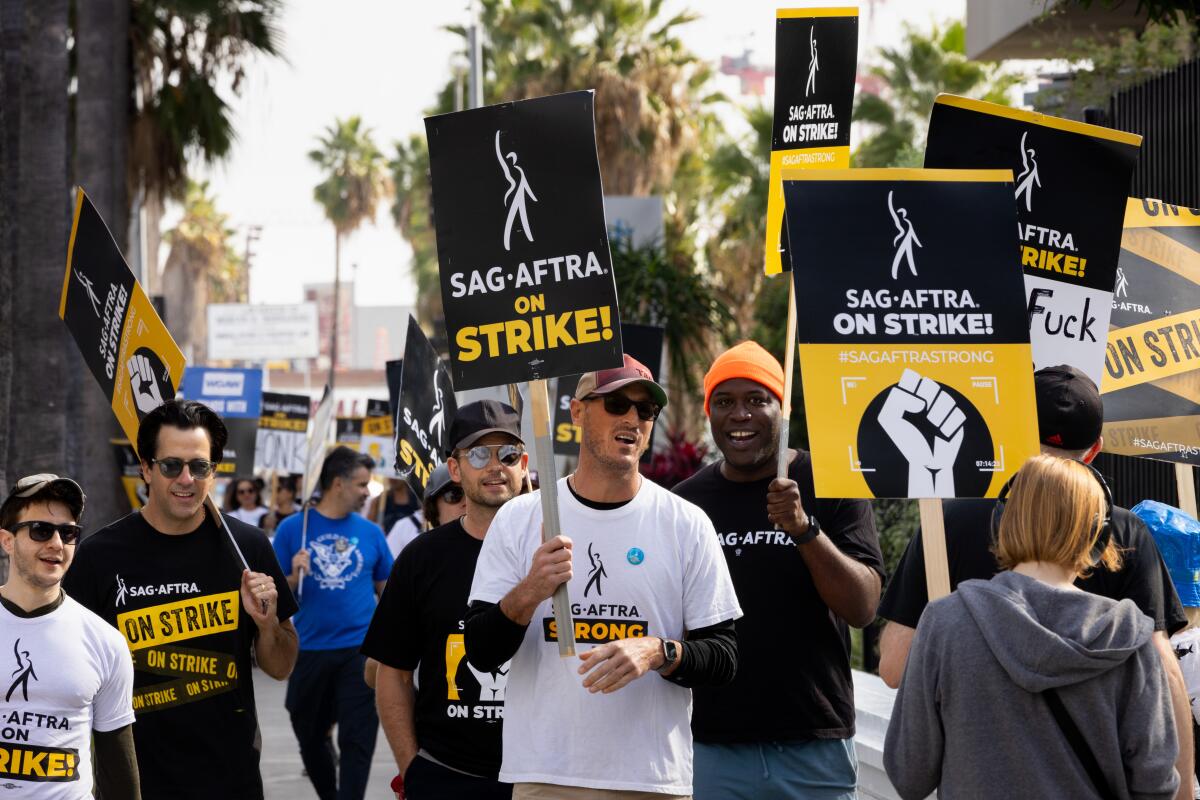
- Share via
Performers union SAG-AFTRA and the alliance representing the major Hollywood studios reached a tentative deal Wednesday to end the historic, 118-day actors’ strike.
“It was a team effort, and all negotiations — to be successful — require deep communication, both within your own side and also with the other side of the table,” said SAG-AFTRA national executive director and chief negotiator Duncan Crabtree-Ireland.
“It’s certainly not perfect for anybody. Any good negotiation, both parties come out of it feeling like they didn’t get everything they wanted. But I think we did get everything we needed and then some. And I think that is going to be the legacy of this negotiation.”
If approved by union members, the tentative contract would end a strike that lasted nearly four months and shut down Hollywood film and TV productions.
Actors have been on the picket lines since July 14, demanding higher minimum pay, increased residual payments for streaming shows and improved health benefits, as well as protections related to self-taped auditions and the use of artificial intelligence in filmmaking.
But it’s not over quite yet — the settlement still has to go through a multi-step approval and ratification process before the strike is officially off. Here’s what happens next.
SAG-AFTRA’s national board will review the deal
After it voted unanimously to approve the tentative agreement, the guild’s negotiating committee must now pass the deal along to SAG-AFTRA’s national board of directors.
In a meeting set for Friday that will likely be held over Zoom, the negotiating committee will present the deal points to board members, who will have the opportunity to ask questions and mull over the items before voting on whether to approve it or not, according to national board and negotiating committee member Shaan Sharma.
“The breadth of everything that is in [the deal], the new innovative things that were negotiated this time — especially having to address things like AI that are incredibly complex ... I can imagine there’ll be a lot of questions,” Sharma said.
“It’s definitely going to take time, and we would want to take the time to make sure all the national leaders of the union understand what we’ve just done.”
SAG-AFTRA has approved a deal from the studios to end its historic strike. The actors were on strike for more than 100 days.
Sharma expects the board will arrive at a decision by the end of the day on Friday. If the majority of the board votes to approve the deal, it will go to the guild’s membership for ratification. If the board rejects the deal, the baton is passed back to the negotiating committee to work toward a new agreement with the Alliance of Motion Picture and Television Producers — a “highly unlikely” scenario, according to Sharma.
Guild members decide whether to ratify
After the national board approves the deal, SAG-AFTRA‘s 160,000-person membership will get the chance to vote on whether to ratify it.
Rank-and-file members will probably have a window of at least two weeks to vote on the new contract. The board will determine the precise length of the member voting period during its meeting with the negotiating committee on Friday.
If a majority of members vote to ratify the contract, the strike is officially over. If ratification fails, the strike will resume.
Sharma said that ratification is likely, as actors guild members have never not ratified a contract.
SAG-AFTRA said it responded Monday to what the AMPTP described as its ‘last, best and final offer’ to end the actors’ strike
When can actors start working again?
The strike will be suspended until ratification, and all picket locations will shut down starting at 12:01 a.m. on Thursday. At that point, actors are allowed to return to work.
But actor, comedian and strike captain Elyssa Phillips pointed out that going “back to work” will look different for each person who put their acting career on pause in solidarity with their fellow performers.
“There’s only a handful of actors that get to go back to work when all of this is over,” Phillips said Wednesday while cooking dinner in between a stint on the picket lines and her next shift waiting tables.
“Everyone just goes back to auditioning and back to their normal lives. The people who wait tables will still be waiting tables. They just may have auditions after work. But I’ve never been so excited to audition in my entire life.”
When will production resume?
Probably as soon as possible, if the major Hollywood studios and the thousands of entertainment industry employees (not just actors and writers but crew members and other production workers as well) who have gone largely without work for nearly seven months have any say.
For the latter half of 2023, the dual Hollywood strikes have caused widespread production delays, threatening to put next year’s film and TV slate in jeopardy. Among the highly anticipated titles that have already been bumped from 2024 to 2025 because of the work stoppages are the eighth installment in Paramount’s “Mission: Impossible” franchise and Disney’s live-action remake of “Snow White.”
Entertainment industry employees are eager to get back to work, studios are desperate to salvage their release calendars and theaters can’t afford to lose more blockbusters (and moviegoers) while still recovering from the COVID-19 pandemic — let alone the twin walkouts.
Times staff writers Meg James and Wendy Lee contributed to this report.
More to Read
Inside the business of entertainment
The Wide Shot brings you news, analysis and insights on everything from streaming wars to production — and what it all means for the future.
You may occasionally receive promotional content from the Los Angeles Times.
